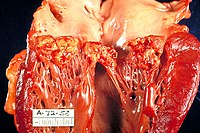
Photo from wikipedia
Type of funding sources: None. Infective endocarditis is a condition associated with poor outcomes. Even though we have guidelines that establish which patients could benefit from surgery, the decision to… Click to show full abstract
Type of funding sources: None. Infective endocarditis is a condition associated with poor outcomes. Even though we have guidelines that establish which patients could benefit from surgery, the decision to perform it is not straightforward and there are many factors to be considered before we decide surgical approach. To establish the impact of surgery versus medical treatment in patients with surgical indication according to the ESC guidelines, in our population. The primary outcome was a composite of death, embolic events, and recurrence of infective endocarditis. We performed a retrospective study of the patients admitted to our center between 2000 and 2020, with the diagnosis of infective endocarditis. After selecting the patients with surgical indication, according to ESC guidelines, we divided them in two groups: group A (submitted to surgery) and group B (medical therapy only). A total of 70 patients (65.7% males, 34.3% females, mean age 68.5 ± 15.2) were included. Of these 51.4% were submitted to surgery and 48.6 % received only medical therapy. The group A patients were significantly younger (mean age 63.03 ± 16.03 versus 75.52 ± 10.40, p<0.001). There were no statistically significant differences in terms of previous history of heart failure (p=0.09), valvular heart disease (p=0.83), ischemic heart disease (p=0.47), diabetes (p=0.50), obesity (p=0.17), chronic kidney disease (p=0.68). In terms of local complications, group A had a higher prevalence of severe valvular regurgitation (72.2% vs 36.4%, p= 0.003), with no statistically significant differences in abscess, aneurysm, fistula. During a mean follow-up of 28.66 ± 39.07 months, 42 pts (60%) experienced the composite endpoint. Group A had significantly better outcomes compared to group B (47.2% versus 26.5%, p= 0.016). In a multivariate regression analysis, after adjusting for all the possible confounders, including age, not performing surgery was an independent predictor of the composite endpoint (HR 2.23 95% CI: 1.16-4.55, p=0.02). In patients with surgical indication, surgery was associated with a significant improvement in prognosis. In our population, older patients were more likely to receive medical therapy. However, surgery was associated with better outcomes, independently of age, which suggests that this shouldn’t be the only factor that determines whether surgery is performed or not.
Journal Title: European Heart Journal: Acute Cardiovascular Care
Year Published: 2023
Link to full text (if available)
Share on Social Media: Sign Up to like & get
recommendations!